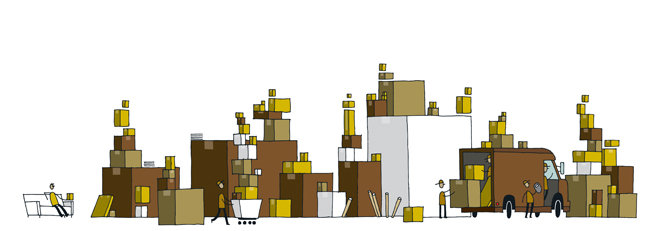
Working Toward My Peak
FEATURE-November + December 2011
By Isaac Kestenbaum
Illustrations by Alex Eben Meyer
Working toward my Peak at the height of the holiday season.
United Parcel Service workers refer to the annual holiday-driven freight increase as simply “Peak.” They talk about Peak as if it’s a force of nature, as unpredictable and powerful as a winter storm in Maine. They say things like, “When Peak hits, we’ll be really busy,” and “We don’t know what Peak is going to be like this year.” To combat Peak, UPS hires thousands of extra workers every year, known as “driver helpers,” for the month between Thanksgiving and Christmas.
At 26, I’ve just moved from small-town Maine to the big city—Portland—and I have yet to find work. After weeks of watching the Internet swallow my inquiry letters and resume, helping a UPS driver seems like a good move.
For once, my job application results in an interview, which takes about five minutes. I’m hired shortly after, and within weeks I head to an orientation in a processing facility in South Portland—a wilderness of outlet stores and industrial buildings. The interior of the UPS building is cavernous and dark, and the familiar brown trucks line the walls like hibernating animals. In a fluorescent room somewhere in the belly of the facility, a few instructors explain what the other driver helpers and I will be doing for the next month.
We’re informed of the great responsibility that comes with the job: “You are Santa,” one instructor says. We learn the UPS dress code: no facial hair below the upper lip, no long hair, shoes that can take a shine. Much of the orientation concerns something called a Diad, which is a large, brown calculator-looking device that anyone who has received a UPS package has probably seen. We will use the Diad to scan all the parcels we drop off and pick up, and to track the notes that we leave on doors. The Diad is also to be deployed, we learn, as a weapon of last resort if a dog attacks.
Dogs are real hazards for UPS employees. Perhaps it’s the uniform. “When I come home in the browns, even my dog wants a piece of me,” one of the instructors says. Other dangers include slipping on ice or simply getting an injury from the physical requirements of the job—we’re told that we will be “industrial athletes.”
The following month I’m given a route. I don’t ride around in a van; instead, I go every morning to Portland’s Old Port, a mecca for holiday shoppers, where a small trailer full of packages awaits me. I load the boxes onto a handcart, which I push up and down bustling Exchange Street and over cobblestoned side streets crisscrossing the neighborhood. I deliver to restaurants, coffee shops, bookstores, jewelers, movie theaters, a hookah bar, and even a sex shop.
One UPS driver is my supervisor, and he and the other drivers in the area occasionally check on me. I find them to be patient and friendly men, often profane, who call UPS “Big Brown.” They know every street, stop sign, and traffic light in the city, and are unflappably calm even when Peak is at its height. Also, they tend to be very knowledgeable about which stores and buildings feature the most attractive girls.
Most shop owners ignore me, seeing only the uniform, and some are actually rude. One store is so unpleasant that I vow never to shop there again. Other merchants go out of their way to be kind, like the hot dog vendor who gives me holiday candy whenever I walk past his cart. I get free coffee from the coffee shops. The ladies at the sex shop refer to me as “the handsome UPS guy.”
Occasionally I find a priority envelope in the morning. As the name implies, these must be delivered first, and they’re usually destined for the offices of lawyers or accountants. At one law firm, a man asks me what I want to do with my life. The implication is clear: what I’m doing at the time—working as a deliveryman—isn’t good enough. I leave flustered and indignant.
But still, the checks come every week. The packages are there every morning. I go through two pairs of gloves, and the fat melts from my mid-section, replaced by an abdominal definition that has been absent for several years. I’m given spikes to fit over my boots to negotiate the ice. It starts to hurt when I raise my right shoulder too high. Delivering an entire trailer’s worth of packages becomes an enjoyable challenge. At night, I’m contentedly tired.
Christmas comes, Peak passes, and so too does my gig as a driver helper. Luckily, another job comes through: a coveted position at the city newspaper. But not long into the new year, UPS calls me and asks if I’d like to work for them. I decline, explaining that I’ve landed my dream job. Still, I find that I am flattered to have attracted the interest of Big Brown.
The office building where I work is only a block from where I used to haul boxes, and I often see the drivers I’ve befriended. They’re always willing to stop and chat about work and girls. The UPS drivers are a constant, reassuring presence, especially as the dream job ceases to be dreamlike, and even more so after I quit that job for an uncertain future—as uncertain as the path of a storm or an influx of holiday packages.

